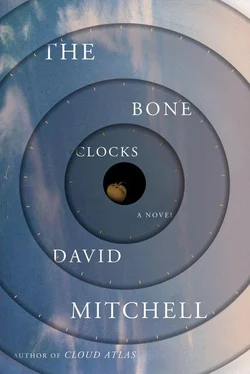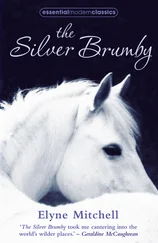“No, more’s the pity. When I was in Basra I was due to interview the British governor in Amara but that morning the UN headquarters got bombed in Baghdad, so I drove back for that. Now Amara’s too dangerous to visit, so I missed my chance. Did you visit?”
“A few months before Thesiger, yes, but I only stayed a fortnight. The village headman’s wife took a shine to me. D’ye know, I still dream of the marshes? Not much left of them now, I hear.”
“Saddam had them drained, to deny his enemies cover. And what’s left is riddled with land mines from the war with Iran.”
Eilísh bites her lip and shakes her head. “That one wretched man gets to eradicate an entire landscape and a way of life …”
“Did you never feel threatened on your epic ride?”
“I had a Browning pistol under my saddle.”
“Did you ever use it?”
“Oh, only the once now.”
I wait for the story, but Great-aunt Eilísh smiles like a sweet old dear. “ ’Tis grand meeting you in the flesh, Ed, at long, long last.”
“Sorry I’ve never come over with Holly and Aoife. It’s just …”
“Work, I know. Work. Ye’ve wars to cover. I read your reportage when I can, though. Holly sends me clippings from Spyglass . Tell me, was your father a journalist as well? Is it in the blood?”
“Not really. Dad was a … sort of businessman.”
“Is that a fact now? What was his line, I wonder?”
I may as well tell her. “Burglary. Though he diversified into forgery and assault. He died of a heart attack in a prison gym.”
“Well, aren’t I the nosy old crone? Forgive me, Ed.”
“Nothing to forgive.” Some little kids rush by our table. “Mum kept me on the straight and narrow, down in Gravesend. Money was tight, but my uncle Norm helped out when he could, and … yeah, Mum was great. She’s not with us anymore either.” I feel a bit sheepish. “God, this is sounding like Oliver Twist . Mum got to hold Aoife in her arms, at least. I’m happy about that. I’ve even got a photo of them.” From the band’s end of the room comes cheering and clapping. “Wow, look at Dave and Kath go.” Holly’s parents are dancing to “La Bamba” with more style than I could muster.
“Sharon was telling me they’re after taking lessons.”
I’m ashamed to admit I didn’t know. “Holly mentioned it.”
“I know ye’re busy, Ed, but even if it’s just a few days, come over to Sheep’s Head this summer. My hens’ll find room for ye in their coop, I dare say. Aoife had a gas time last year. Ye can take her pony trekking in Durrus, and go for a picnic out to the lighthouse at the far tip of the headland.”
I’d love to say yes to Eilísh, but if I say yes to Olive, I’ll be in Iraq all summer. “If I possibly can, I will. Holly has a painting she did of your cottage. It’s what she’d rescue if her house was on fire. Our house.”
Eilísh puckers her pruneish old lips. “D’ye know, I remember the day she painted it? Kath came over to see Donal’s gang in Cork, and parked Holly with me for a few days. 1985, this was. They’d had a terrible time of it, of course, what with … y’know. Jacko.”
I nod and drink, letting the icy gin numb my gums.
“It’s hard for them all at family occasions. A fine ball of a man Jacko’d be by now, too. Did ye know him at all, in Gravesend?”
“No. Only by reputation. People said he was a freak, or a genius, or a … Well, y’know. Kids. I was in Holly’s class at school, but by the time I got to know Holly well, he was … It’d already happened.” All those days, mountains, wars, deadlines, beers, air miles, books, films, Pot Noodle, and deaths between now and then … but I still remember so vividly cycling across the Isle of Sheppey to Gabriel Harty’s farm. I remember asking Holly, “Is Jacko here?” and knowing from her face that he wasn’t. “How well did you know Jacko, Eilísh?”
The old woman’s sigh trails off. “Kath brought him over when he’d’ve been five or so. A pleasant small boy, but not one who struck you as so remarkable. Then I met him again, eighteen months later, after the meningitis.” She drinks her Drambuie and sucks in her lips. “In the old days, they’d’ve called him a ‘changeling,’ but modern psychiatry knows better. Jacko at six was … a different child.”
“Different in what way?”
“He knew things — about the world, about people, all sorts … Things small boys just don’t — can’t — shouldn’t know. Not that he was a show-off. Jacko knew enough to hide being a dandy, but,” Eilísh looks away, “if he grew to trust ye, ye’d be given a glimpse. I was working as a librarian in Bantry at the time, and I’d borrowed The Magic Faraway Tree by Enid Blyton for him the day before he arrived because Kath’d told me he was a fierce reader, like Sharon. Jacko read it in a single sitting, but didn’t say if he’d enjoyed it or not. So I asked him, and Jacko said, ‘My honest opinion, Auntie?’ I said, ‘I’d not want a dis honest one, would I?’ Jacko said, ‘Okay, then I found it just a little puerile , Aunt.’ Six years old, and he’d use a word like ‘puerile’! The following day, I took Jacko to work with me and — not a word of a lie — he pulled Waiting for Godot off the shelves. By Beckett. Truth be told, I assumed Jacko was just attention-seeking, wanting to amaze the grown-ups. But then at lunchtime we ate our sandwiches by the boats, and I asked him what he’d made of Samuel Beckett, and”—Eilísh sips her Drambuie—“suddenly Spinoza and Kant were joining our picnic. I tried to pin him down and asked him straight, ‘Jacko, how can you know all this?’ and he replied, ‘I must have heard it on a bus somewhere, Auntie — I’m only six years old.’ ” Eilísh sloshes her glass. “Kath and Dave saw consultants, but as Jacko wasn’t ill, as such, why would they care?”
“Holly’s always said that the meningitis somehow rewired his brain in a way that … massively increased its capacity.”
“Aye, well, they do say that neurology’s the final frontier.”
“You don’t buy the meningitis theory, though, do you?”
Eilísh hesitates: “It wasn’t Jacko’s brain that changed, Ed, it was his soul.”
I keep a sober face. “But if his soul was different, was he still—”
“No. He wasn’t Jacko anymore. Not the one who’d come to visit me when he was five. Jacko aged seven was someone else altogether.” Octogenarian faces are hard to read; the skin’s so crinkled and the eyes so birdlike that facial clues are obscured. The band have been nobbled by the Corkonian contingent; they strike up “The Irish Rover.”
“I presume you’ve kept this view to yourself, Eilísh?”
“Aye. They’d be hurtful words as well as mad-sounding ones. I only ever put it to one person. That was himself. A few nights after the Beckett day there was a storm, and the morning after Jacko and I were gathering seaweed from the cove below my garden, and I came right out with it: ‘Jacko, who are ye?’ And he answered, ‘I’m a well-intentioned visitor, Eilísh.’ I couldn’t quite bring myself to ask, ‘Where’s Jacko?’ but he must’ve heard the thought, somehow. He told me that Jacko couldn’t stay, but that he was keeping Jacko’s memories safe. That was the strangest moment of my life, and I’ve known a few.”
I flex my leg; it’s gone to sleep. “What did you do next?”
Eilísh face-shrugs. “We spread the seaweed over the carrot patch. As if we’d agreed a pact, if you will. Kath, Sharon, and Holly left the next day. Only,” she frowns, “when I heard the news that he’d gone …” she looks at me, “… I’ve always wondered if the way he left us wasn’t related to the way he first came …”
Читать дальше












